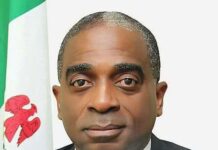
Then
Since Wasiu Ayinde Marshal, a.k.a K1, stirred the hornets next after his birthday statement a few weeks ago that his mentor, the late Sikiru Ayinde Barrister, was not the creator of Fuji music, the spokesman of the latter, Mr Dayo Odeyemi, has slammed K1 over his controversial statement.
In a release made available to R, the journalist, who had written three books on the history of Nigerian music-Mr Fuji, My Memoir and Pioneer Entertainers, after due consultation with the family, friends and fans of Barrister, said it became imperative for him to comment on the outburst of Wasiu Ayinde.
“K1 was reported to have, at a forum in Lagos, chided his mentor, Barrister, insinuating that he was not the creator of fuji music. He also reportedly claimed that he singlehandedly gave Barrister a befitting burial in response to his earlier promise he made to him before he died. In addition, K1 dismissed the statement of the founding father of Fuji music, Ayinde Barrister, that the word Fuji was derived from the Japanesse mountain of love.
“It is most unfortunate that these statements are credited to K1, just as well as they are laughable. It is a flagrant display of arrogance and naivety on his part,” Odeyemi stated.

Now
While clarifying how Fuji music came to be, he said; “K1 was never a part of the history of Fuji creation as the music itself (fuji) was seven years old as at the time he came into music. K1, who is claiming to know much about Fuji, joined Barrister’s organisation in 1974 after dropping out from Ansarudeen High School, Ijebu Isiwo.”
As at that time, Barrister had released 19 records, including two singles and one extended play. So, if we subtract 1967, when Barrister released his first record entitled “Waya Rabi”, from 1974 when K1 joined the organisation as a parker, it is 7 years. In other words, fuji music is 7 years older than K1, who is now trying to rewrite the history of what he knew nothing about its creation.
“Between 1966 and 1980 when K1 released his first album after leaving Barrister Organisation in 1978/79, Barrister had released 38 long playing records. The question is: at what stage did K1 modernise fuji music when his first hit album, Talaso 84, was a copy of Barrister’s Fuji Funky series 1 and 2.
“On his claim that he promised Barrister that he would give him a befitting burial; where did he meet the old man to discuss that? It is on record that K1 visited Barrister just once in the 10 months that he was hospitalised at the Havana Hospital in Surulere. It is equally on record that it was former Lagos State governor, Mr Babatunde Fashola, who donated money for all the funeral expenses, including the feeding and security arrangement at fuji chambers,and also Tafawa Balewa Square in Lagos. So, at what stage did K1 spend his money, bearing in mind that a burial committee, headed by Buhari Oloto, had been put in place by the Lagos State government to handle the burial arrangement. “K1 cannot deny the fact that he was taking orders from Alhaji Oloto, who was in total control of the programme. I want to appeal to Wasiu Ayinde to desist forthwith from destroying the legacy of the man who gave him his source of livelihood.
He should also tell the world what he has done for the Barrister family despite all the promises he made to the children and wife of his late mentor. That if he did not desist from the display of hatred and campaign of calumny, which he had embarked upon from the time the man was alive till date, he may be further exposed on his estranged relationship with the late music icon,” warned Odeyemi.





